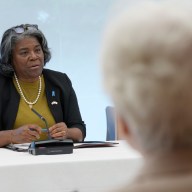“Dollhouse” follows the search for self-awareness by a woman methodically stripped of hers. At the same time, it’s a thriller about the plushest escort service in the history of the world. And along with its brooding intrigue and sexual sizzle, there are some laughs.
“We go to some very silly places,” promises Joss Whedon, the series’ mastermind.
Who but Whedon could round up so many disparate elements, pile on even more ideas, then fuse the whole thing into a juicy TV series?
Remember, he was the guy with enough creative moxie to launch the Old West into outer space with his beloved, if short-lived, “Firefly.” And he dared to build a campy horrorfest around a girl named Buffy whose days were filled with school, friends – and vampire slaying.
Now comes “Dollhouse,” the 44-year-old Whedon’s latest, much-awaited bubbling brew, which premieres Friday on Fox and Global.
It stars Eliza Dushku (whose credits include “Buffy the Vampire Slayer,” “Bring It On” and the recent “Bottle Shock”) as Echo, a customized companion with a seven-figure price tag – per day. No wonder. Echo’s science-savvy keepers at the Dollhouse have wiped clean her inborn consciousness so that she, like her fellow male and female “Actives,” can be ideally personalized for each client.
“Everything you want, everything you need, SHE will be,” the Dollhouse boss explains to a prospective customer, emphasizing that Echo does it “honestly and completely.”
And when Echo emerges from each job/assignment/caper, she asks, “Did I fall asleep?” Her latest identity makeover has been neatly expunged.
That’s life in the Whedon-conjured Dollhouse, a luxury residential spa for its Actives, who are pampered in their off-time and protected when they’re hired out.
Does this glamorous depiction make Whedon an apologist for prostitution?
“The first person who ever said that this show was in danger of doing the worst thing possible, and somehow glorifying human trafficking, was me,” he says. “Obviously, that’s the last thing I want to do.”
Instead, he wants “Dollhouse” to examine the stuff that fascinates him (such as why people want what they want and what they’ll do to get it), all played out in a fantasy world.
“The issues we are dealing with have nothing to do with the reality of how those things are,” says Whedon, adding that a big part of the show asks: “What are we ashamed of, that we shouldn’t be? And, what are we not ashamed of, that we should be?”
Inquiries like that are not the usual province of a network TV series. Nor is a heroine whose defining trait (other than her gorgeous looks) is an identity that isn’t there.
Or is it?
“The heart of the show is Echo’s evolution as a person, her struggle to self-actualize,” Whedon says. “When she’s in her doll-like state, she is so vulnerable and so trusting. And yet she’s naturally inquisitive, so she can’t stay in that state – no matter what they do to her.” Even in the Dollhouse, science has its limitations.
The premiere of “Dollhouse” marks an interim step for the series, not its beginning, in the eyes of Whedon devotees. For a year or more, they have monitored news of the show’s development. And they’ve been worried by reports of its difficult gestation. (In one seeming setback, Whedon chose to scrap the show’s pilot and reshoot from scratch.)
Has this intense fan focus resulted in a show that, upon its arrival, might already seem in trouble?
“I don’t think that’s something that hurts us in any real way,” says Whedon, who spoke gratefully of his fans’ abiding interest. “The people who feel that the show may have been compromised are the people who are probably going to hang in.”
With shooting of the season’s 13 episodes having wrapped last week, Whedon calls on all “Dollhouse” watchers to take the long view.
“I feel very strongly that there are a lot of exciting elements in place from the start,” he says. “But the storytelling, and what we’re able to do with the premise, grows throughout the season. We reach a place that’s very much the place I had intended to get to – we just got there by a different path” than he might have preferred.
“After a dark sort of search to figure out ‘what is the show?’ and ‘how do we keep the integrity of the show?’ we finished the season feeling a creative high,” he says, looking happy.
On a show like “Dollhouse,” call this a process of self-actualization.
















